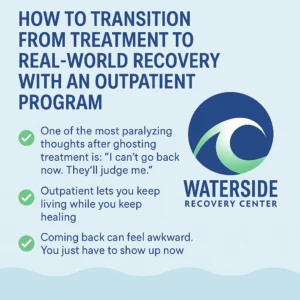Somewhere between “I need help” and “I’ve got this,” a lot of people disappear.
Maybe you dropped out of IOP halfway through. Maybe you stopped answering your group therapist’s calls. Maybe you felt overwhelmed—or underwhelmed—and convinced yourself it wasn’t worth it.
Whatever the story, here’s what matters: you’re not broken. You’re not disqualified. And you’re not the only one.
The outpatient program at Waterside Recovery in Plymouth County, MA exists for people who’ve stumbled, ghosted, or hit pause—and still want to find their way forward. This isn’t about judgment. It’s about offering a way back.
You Didn’t Fail. You Hit a Fork in the Road.
Let’s kill the shame right now: stepping away from treatment doesn’t mean you didn’t care. It means something got in the way. That could be burnout. A work schedule. A relapse. A breakup. Or just the inner weight of holding it all together for too long.
Most people don’t quit because they don’t want recovery. They quit because recovery in a vacuum is different than recovery in the real world. That’s why outpatient care exists—to meet you where you are, not where someone else thinks you should be.
Start Where You Are—Not Where You “Should” Be
One of the most paralyzing thoughts after ghosting treatment is: “I can’t go back now. They’ll judge me.”
We hear that all the time.
But outpatient programs like ours aren’t about picking up where you left off. They’re about beginning from where you actually are—without punishment, paperwork shame, or reentry drama.
If it’s been weeks or months since you walked out, we’re still here. If your last program felt too intense or too rigid, this is a softer landing. You get to come in as you are—not as who you think we want you to be.
Outpatient Lets You Keep Living While You Keep Healing
A lot of people drop out because their schedule can’t flex around treatment. That’s real. But outpatient care flips the equation.
Instead of pressing pause on your whole life to get better, outpatient support weaves into your life. You can:
- Keep your job
- Stay connected to your family
- Show up for responsibilities
- And still make progress on your recovery
Outpatient sessions are usually a few times a week—long enough to matter, short enough to manage. You don’t have to choose between getting better and getting through the day.
Quick Tips for Re-Entering Outpatient Care After a Break
Hitting resume on treatment doesn’t have to be dramatic. Here’s how to make the return smoother:
Quick Tips for Getting Back Into Outpatient Care
- Pick 2–3 time slots that actually work with your current schedule—start small and build up.
- Be honest in your intake about why you left before. No one’s judging—you’re helping us help you.
- Tell one person you trust that you’re giving treatment another shot. Accountability ≠ pressure.
- Treat the first few sessions as recon—not a final exam. You’re learning, not performing.
This Is Where Real-Life Recovery Happens
Let’s be real: inpatient treatment creates a bubble. Controlled space. Few triggers. Minimal distractions.
But healing inside a bubble is different from healing in the world.
Outpatient care is where you take what you’ve learned and apply it in real time. It’s the testing ground. The proving space. The place where slip-ups don’t mean starting over—they mean you’re doing the work where it counts.
You’re not just processing emotions. You’re:
- Navigating a bad day without spiraling
- Setting boundaries with friends who still use
- Facing weekends without the old habits
- Managing stress without numbing out
These are real wins. And they happen in outpatient care.

The Support Is Still Real—Even If the Format Is Flexible
Sometimes, outpatient care gets mistaken for “less serious” or “for people who don’t need much help.” That’s false.
At Waterside Recovery, our outpatient program includes:
- Licensed clinicians who understand the nuance of relapse and reentry
- Therapy groups that offer real connection—not just surface talk
- Flexible scheduling that respects your commitments
- Skill-building sessions that address real-world pressure, triggers, and stressors
Outpatient treatment isn’t a downgrade. It’s a different kind of support—one that grows with you, not around you.
Yes, You’re Still Welcome Here
Coming back can feel awkward. You might wonder if people will remember that you left. Or if they’ll ask why. Or if the team will hold it against you.
They won’t.
At Waterside, we know that recovery isn’t a straight line. Most of us who work here have lived through that too.
Your spot is still here. You’re still allowed to try again. You don’t have to apologize for leaving. You just have to show up now.
“They didn’t ask me why I left. They asked me what I needed to stay this time. That changed everything.”
— Outpatient Client, 2023
Looking for Outpatient Program Help in Plymouth County, MA?
Whether you left treatment last week or last year, you’re not locked out of healing. Our outpatient program in Plymouth County is designed to welcome people back in—without shame, pressure, or a reset button.
We also serve surrounding areas like Bristol County, MA if that’s a better fit for your location or support system.
FAQ: Outpatient Program After a Treatment Pause
Can I return to treatment if I left without finishing?
Absolutely. Outpatient programs are designed for flexibility, and reentry after a pause is common. We’ll work with you to assess where you are—not where you were.
Will I have to start over completely?
Not unless you want to. In most cases, we can build on what you’ve already done. The goal isn’t to repeat the past—it’s to move forward from the present.
What if I’m using again?
You’re still welcome. Relapse or resumed use doesn’t disqualify you from treatment—it signals that more support might be needed. Outpatient care can include harm-reduction or more structured steps if that’s right for you.
How do I know if outpatient is the right level of care for me?
If you can maintain basic daily responsibilities and don’t require medical detox or 24/7 support, outpatient may be appropriate. We’ll help you assess fit during a free consultation.
What happens in a typical outpatient session?
It depends on your care plan, but sessions often include group therapy, skills-based workshops, individual counseling, and check-ins on goals and stressors.
Still thinking about coming back?
You don’t need a perfect plan—you just need a little willingness.
Call (866)671-8620 or visit our outpatient program page to learn more about how we support recovery in Plymouth County, MA.


